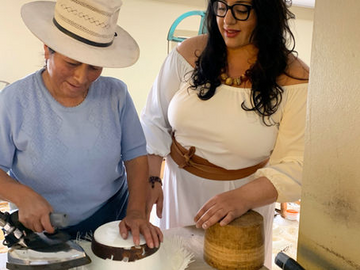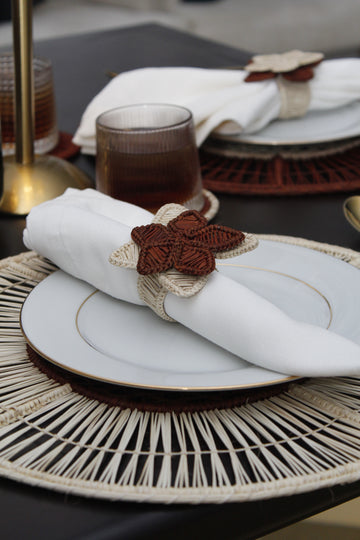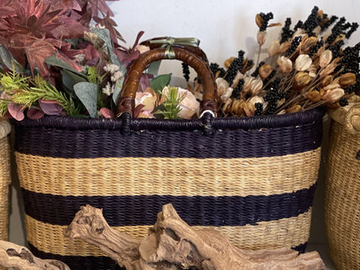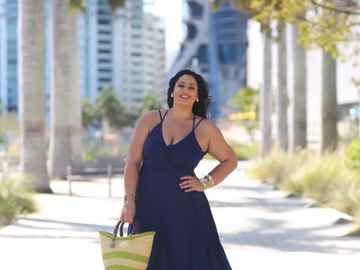Let me just start by tossing it all out there: sticking to our values has been the most expensive and difficult decision I have ever made as a business owner.
Integrity is one tall order.
And boy, oh boy, do I admit that my ladder on the way up has shaken with temptation at times.
Doing the right thing all the time is exhausting. Doing the right thing all the time as a business owner knowing that there are shortcuts and acceptable skims, is even harder.
When we started developing the idea of Sonder and Holliday, my business partner, Victoria Cuesta, and I knew immediately that we would be a values-based brand. From the beginning, I wanted to create a company that took care of its people, paid them fairly, and uplifted them too as we grew and scaled. Victoria wanted the same.

In Ghana with the mother and son duo that create our Marchesa Fans
It was a beautiful ideal, but I sincerely had no clue how tough it would be to stick to those values, especially because of the added costs such metric created in an already competitive market. Still, with Victoria as our Jiminy Cricket and my knack at finding inventive solutions, we were determined to persevere.
Where others may state that they work with artisanal groups via an NGO or third party, I set out to create my own artisanal group. Because of my Colombian background, I understand how some of these male-dominated cultures function, especially in small, rural villages. I knew that the only way to ensure the artisans were paid correctly was if I paid them directly myself. Where most others brands send their payments to one person or organization and not deal with the distribution, I now had to figure out a way get the money in the hands of each weaver that weaved for us.
"And I understood that most business owners would look at these conditions and move forward anyway.
But not us.
This is why we are different."
Tall Order #1 - Getting the Unbanked Banked
With this came the challenge of securing bank accounts for people who didn’t know how to read, write, or calculate. I then had to work with them to establish a formal business, register it with their government, and then create a tax number and organizational charts as well as accounting, logistical, and receiving methods.
Not only was I busy doing this for my own small business, but now I was tasked to do it for theirs in a foreign nation with different laws than mine.

Developing stages of our best selling Montgomery Tray
Aside from ensuring their pay was direct, in the case of our artisan group in Ghana, I felt the urgent need to help them repair their weaving center. There was no reasonable way we could build a luxury brand while having our supplier work in dismal conditions. Even though they are their own business and ultimately improving the condition of their building is their responsibility, I understood why they wouldn’t be able to without our partnership.
Tall Order #2 - Getting in the Trenches with our Suppliers
As many of you have followed me, you know that when I first went to Ghana in 2018, I was floored (no pun intended) by the conditions of the facility, particularly the floors, where the weavers worked. If it had been in the US, that building would have been condemned with caution tape surrounding it.

The unsanitary floor that greeted me when I first visited the center
I understood that these conditions were not just unacceptable, but truly dangerous.
I also understood we are a small business and shouldering the cost to repair and rebuild their center was going to be an extremely daunting task.
And I understood that most business owners would look at these conditions and move forward anyway.
But not us. This is why we are different.
How do we fix this? What do we do? How can we build a luxury brand while working with people who work like this? Victoria and I deliberately chose to build Sonder and Holliday to be part of the solution to sweatshops and exploited labor. We felt that not doing anything about this would just make us like every other brand - our greatest fear.

The weavers working in an unsafe center
In talking with Victoria, we came up with a plan to privately fund the renovation of their center. We called it The Victoria Project. Our concept was to partner with the artisans in a way in which they felt empowered and fully understood that financing the rebuild of the center was accomplished mostly due to their own efforts.
We began to develop a collection where the sales generated will provide the funds to rebuild their business center.
While this is still in the developing stages, the other part of sticking to our values that has been quite the task is the incredible amount of patience working with artisans directly has required from me.
We were adamant that the last thing we would do, was force our Western/American ways on them. They have their own culture, traditions, ways of working, communicating, and expressing that are equally as important as my own and deserve to be acknowledged and respected.
This meant, I had to learn how THEY did business and figure out how to blend that with the way I did business.
Tall Order #3 - Patience is a Virtue, and an Immeasurable Amount will be Required
When we say that we “reinvest in the communities we work with” we don’t mean just money, we also mean patience. A lot of patience.
Things we deem simple in the US are sometimes (literally) foreign ideas to many of the groups we work with. This means that something as common as a creating a packing list can feel like a monkey wrench in the operation for our artisanal groups. Because we have chosen to work directly with them, we also have to help them organize every detail from how they dye the straw, weave some of the items, pack, ship, account for and itemize purchase orders.
A lot of things that are considered universal business basics I’ve had to teach them. And many times, that has meant repetition and practice – finding new ways to communicate the concepts repeatedly until it makes sense for them, and they get our desired result.

Our Weaving Team in Ghana
While they have been learning the process, it has cost the business plenty in added custom fees because documents were incorrect, added shipping costs because items were not packaged efficiently, or damages because the product was not secured. But this education ensures that they not only service us well but any of their customers in the future and is part of our commitment to partnering with the communities from which we source.
These are just some examples.
And rational reasons why most business owners would choose not to go through with these challenges and choose to work with someone else, somewhere else.
But not me. I recognized that these challenges are temporary.
I also recognize that I have easy, faster options with other suppliers who perhaps aren’t as aligned to our values.
But that’s not who we are. We don’t take shortcuts to benefit us at the expense of the people we promised to uplift.
If we did, then that would make us like the rest of them and I know we are better than that.
-Lorena





